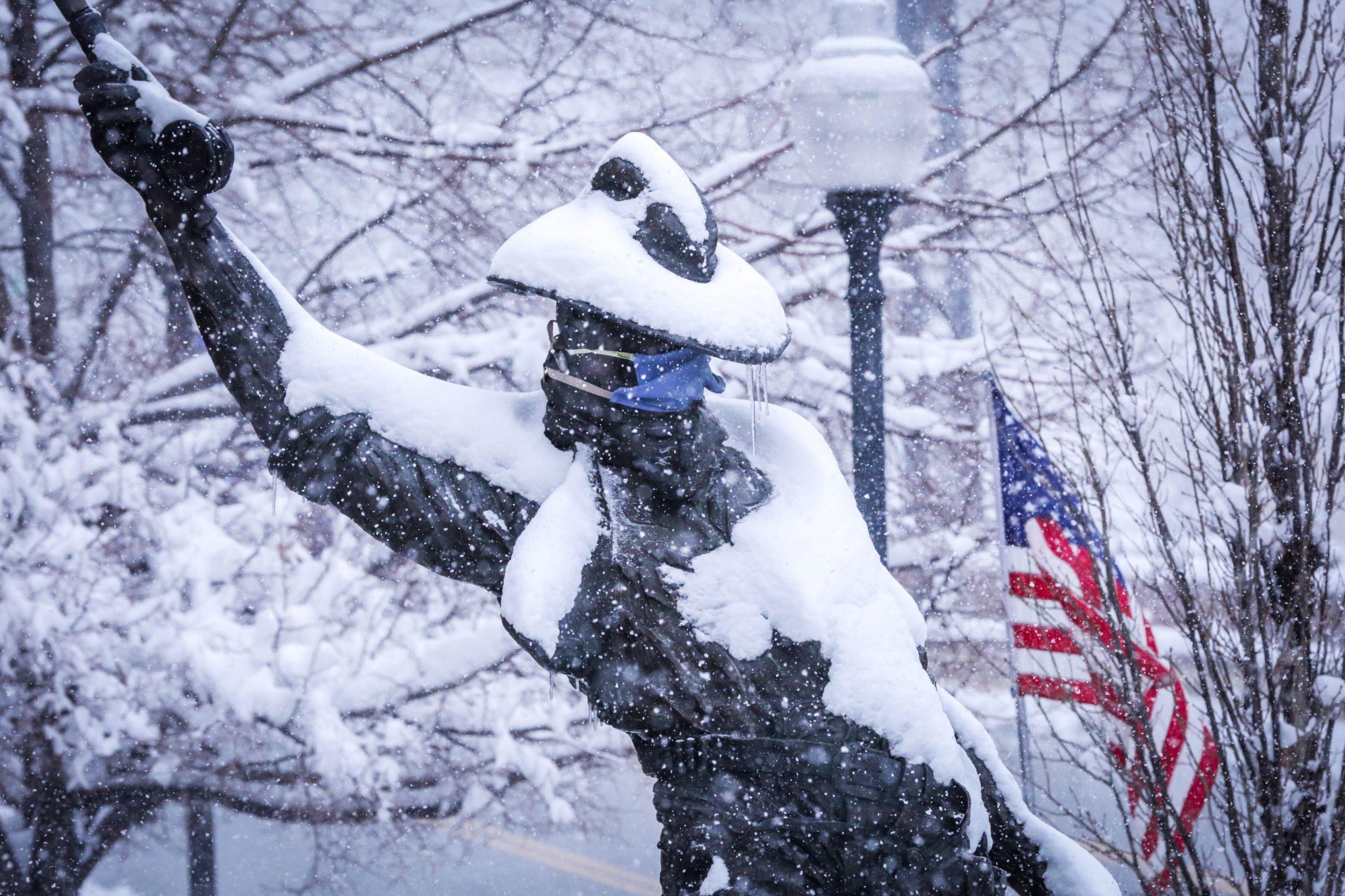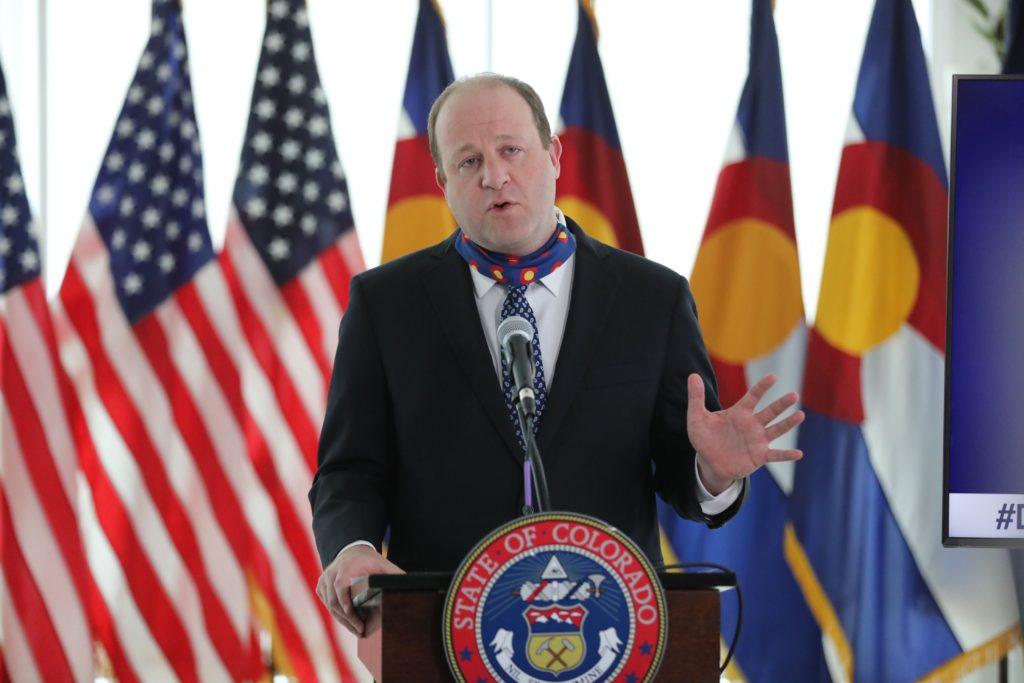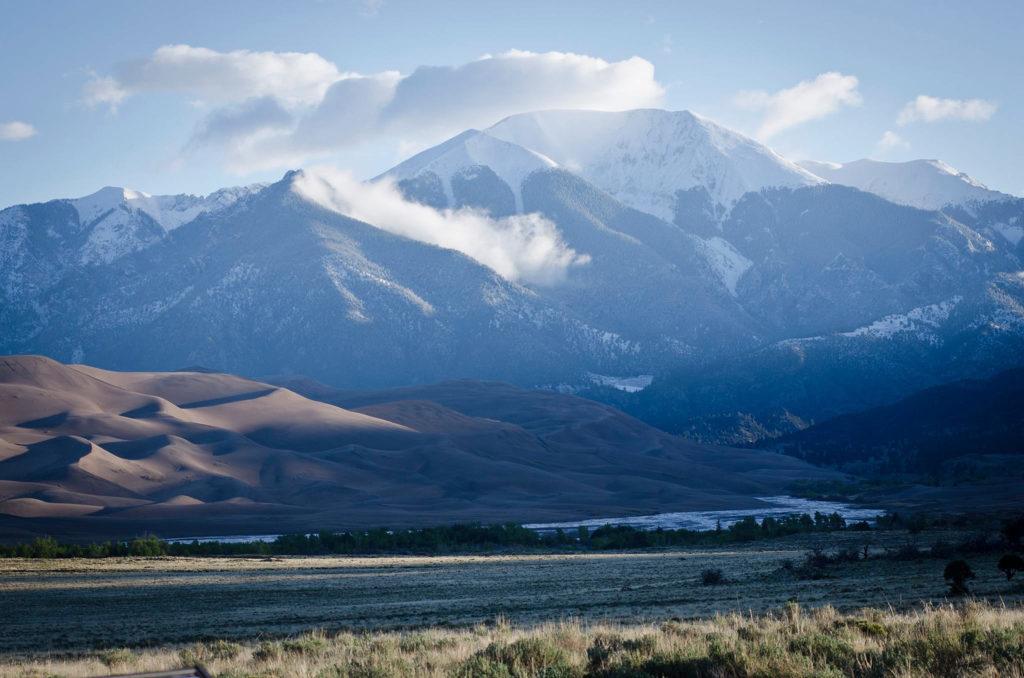
5:03 p.m. — Watch a livestreamed concert from an up-and-coming Denver musician
Denver musician Madeline Johnston recently released “Forever,” her second album as Midwife.
It’s dedicated to her friend and collaborator Colin Ward, who died in 2018. The record is already getting praise from NPR Music and Bandcamp for its haunting and ethereal sound that Johnston describes as “heaven metal.”
Johnston appeared on Colorado Matters today to talk “Forever,” why she sings into a telephone receiver and how she’s passing the time while the live music industry is shut down.
Listen to the interview above, then watch her perform a live concert now.
And listen to the full conversation with Johnston here.
— Daniel Mescher
4:15 p.m. — The latest coronavirus numbers
There are 9,047 confirmed cases of COVID-19 in Colorado as of April 16, according to the latest information from state health officials.
That's an increase of 372 from the previous day.
Seventeen more people have died due to COVID-19, bringing the statewide total to 391 deaths.
1,755 cases have been hospitalized.
There are now 100 outbreaks in factories, long-term care facilities and other places across the state.
Colorado has tested more than 43,000 people.
— Alex Scoville
3:29 p.m. — Polis will speak at 4 p.m.
Colorado Gov. Jared Polis is scheduled to provide a brief update on the state's response to the coronavirus pandemic at 4 p.m. today. Listen live on air and or watch the video feed below.
3:23 p.m. — Cañon City mayor asks Polis to be sympathetic to the "rural dilemma"
An economic upswing grounded. Ten percent of businesses due to close permanently.
Cañon City mayor Ashley Smith outlined the plight of small businesses and the local economy in the city and across Fremont County in a letter to Gov. Jared Polis on Friday.
In her letter, Smith asked Polis for more guidance and more assistance as to when and how small businesses can begin to reopen, as well as more tests.
"We must work together, to open our businesses in a pro-active and health-conscious way. While Cañon City was on the brink of an economic boom just a month ago, we are now on the brink of seeing economic devastation if we cannot move onto the next phase by May 1," Smith wrote.
— Alex Scoville
1:52 p.m. — Colorado hospitals just got 100 ventilators
Colorado officials say 100 ventilators used to care for COVID-19 patients have been delivered to 11 hospitals.
Denver hospitals received the most of any place in the state — 45 were delivered in total to Denver Health, Saint Anthony's and Swedish Medical Center.
State health officials say the machines will be moved around the state based on the needs of hospitalized patients around the state.
The ventilators came from the Strategic National Stockpile. When the pandemic is over, the machines will be returned to the stockpile
Here's the full breakdown:
- Denver Health and Hospital Authority (Denver): 15 ventilators
- University Hospital (Denver): 15 ventilators
- St. Anthony’s Hospital (Denver): 15 ventilators
- Swedish Medical Center (Denver): 15 ventilators
- St. Mary’s Hospital (Grand Junction): 5 ventilators
- Mercy Medical Center (Durango): 5 ventilators
- San Luis Valley Medical Center (Alamosa): 5 ventilators
- Parkview Medical Center (Pueblo): 10 ventilators
- Memorial Central (Colorado Springs): 5 ventilators
- North Colorado Medical Center (Greeley): 5 ventilators
- U.C. Health (Greely): 5 ventilators
— Andrew Villegas
1:38 p.m. — Struggling with staying indoors? Learn from the astronauts on the International Space System, Temple Grandin advises
What should parents of children with autism keep in mind during the stay at home order? Routine for one, says renowned CSU professor Temple Grandin, who has autism.
“Make a new schedule,” she said. “One of the things that's really helped me and made me feel a whole lot better as I get up in the morning is I get dressed and I'm ready for work at eight o’clock — not sitting around in my pajamas. We're going to have to create a new schedule. We're going to get up, get dressed for (online) school.”
It’s solid advice for neurotypical kids, too, and even adults. With families spending a lot of time together inside, Grandin suggests children look up videos of life on The International Space Station (whose crew just returned to Earth).
“How do they use the toilet? Sleeping, eating, dealing with the garbage. It's tight quarters and they have to get along,” Grandin said.
Learning, Grandin explained, can be an antidote to fear. As an animal scientist, it’s something she’s observed in livestock as well as people.
“Basically fear is a big emotion, but another big emotion is ‘seek’ — the urge to explore,” she said.
Think of a strange object in front of a horse, like an umbrella opening, she explained. The horse gets afraid of that.
“But if you took that same umbrella, and you just set it in the middle of a field, the horse will walk up to it because he's approaching it on his own," Grandin said. "So you turn on the seeking system that helps to shut off fear.”
Listen to the full conversation with Temple Grandin on today's Colorado Matters podcast.
— Ryan Warner
12:37 p.m. — This, is Zoom (with NPR pizzazz)
Just in time for your next Zoom play date or happy hour (or work meeting).
12:21 p.m. — CU developing a "SickStick" test
Early in the immune response to a pathogen, the body produces smoke signals that show up in saliva within hours of exposure. Scientists at The University of Colorado Boulder think they’ve found a way to detect those signals and are working to develop a test for COVID-19.
It’s called the SickStick and it would allow for broader testing which could prevent sick people from spreading the virus without knowing it. The only problem is the test won’t be ready for 6-8 months — and even that timeline is ambitious.
“We're hoping that that device will be available in the fall or winter when this pandemic is likely to resurge again,” Nick Meyerson, a Molecular, Cellular and Developmental Biology department scientist who’s worked to develop the test.
The scientists behind the device are collecting data to submit to the Food and Drug Administration for an Emergency Use Authorization. Meyerson is confident they will be able to detect COVID-19, but they’re still collecting data.
The signals that SickStick detects are nucleic acids — DNA and RNA — that cells produce when they recognize a pathogen has broken in. They’re some of the earliest signs scientists know about that indicate the body has detected an intruder.
Scientists don’t quite understand how or why those signals end up in the saliva. “But what we do know is that regardless of what kind of infection you're dealing with, whether it's bacterial, viral or fungal, and whether it's in your blood or in your stomach or in your lungs, somehow this signal gets released into your saliva,” Meyerson said.
Originally, the device was developed to test almost any infectious disease. Meyerson’s advisor, Sara Sawyer, a professor at CU Boulder and a virologist at the BioFrontiers Institute, received funding from the Department of Defense which is where the concept for the device was born.
“At military bases, because the soldiers are kept at such close quarters, infectious disease can spread like wildfire,” Meyerson said. “They essentially deal with epidemics all the time and so they really wanted a device that could detect if somebody's getting sick before the thermometer could.”
Current COVID-19 tests, which are in short supply and high demand across the country, detect the virus’ genetic material, which is only prevalent in large enough numbers to test after days of the virus replicating. Antibody tests, or serologic tests, indicate that a person has already been exposed to a virus and has recovered. Those tests are on their way to being available, although their reliability is still questioned by some public health experts.
— Claire Cleveland
Noon — Polis will speak later today

The governor will provide an update on the state's response to the coronavirus from the Governor's Residence at the Boettcher Mansion. His remarks are scheduled for 4 p.m. MDT and Colorado Public Radio will carry them live. Find a signal near you or ask your smart speaker to "Play CPR News."
11:35 a.m. — "Hamilton" sale postponed
The Denver Center for Performing Arts announced Friday morning that a planned sale of tickets to the still wildly-popular musical "Hamilton" has been postponed due to concerns about the coronavirus.
"We are mindful that Colorado's public officials and our nation's health experts are telling us all to shelter in place and we continue to monitor their orders and recommendations," read a statement from the DCPA. "Based on Governor Polis’ recent press conference, and out of an abundance of caution, we are going to postpone the on-sale for 'Hamilton' scheduled for Monday, April 20."
The actual performances are still scheduled for August 12 to October 4. If that remains the case, a new date will be announced in the future for ticket sales. Updates can be found here.
— Chuck Murphy
11:11 a.m. — Update for gig workers looking for unemployment
You can apply online at ColoradoUI.gov
10:51 a.m. — JBS was warned by Weld
Weld County warned the Greeley meatpacking plant to adhere to social distancing and to screen employees about a week before it moved to shut the plant down.
An investigation by public health officials found at least nine COVID-19 positive employees worked while sick last month. Workers say the plant's culture encourages employees to work while sick.
The county ordered the plant to screen every employee for a fever and cough. The union that represents the workers says not everyone was screened. Officials ordered the plant to close on April 10.
— Natalia Navarro
10:14 a.m. — Fort Carson hospital unit returns tonight
Fort Carson's 627th Hospital Center had been deployed to Seattle where they built a field treatment site at the Seahawks football stadium. Gov. Jay Inslee returned the site, unused, to the government so it could be redeployed to another state facing a crisis.
The Seattle area saw the country’s first coronavirus outbreak, but Inslee and others made the decision in early April after they projected that the state’s hospitals wouldn't be overwhelmed.
When the personnel return to the Colorado Springs base they will self-quarantine for 14 days. They also remain on standby in case they are needed in other parts of the country.
— Jim Hill, Associated Press
9:53 a.m. — Protests planned for this weekend
People unhappy with Colorado's "stay-at-home" order plan to protest in Denver this weekend. The demonstrations follow similar ones around the country.
The idea is for protesters to mainly stay in their cars, drive around in a group to demand the government reopen. The Denver protest is on Sunday according to a Facebook event page.
One organizer said the statewide order is too broad and causes too much economic pain. Instead, he wants to see more targeted measures, like quarantines for older and at-risk people, requiring masks outside the home and having businesses take people's temperatures before letting them in.
Gov. Polis has said he's still evaluating when, and how, the state will start to reopen.
— Megan Verlee
9:27 a.m. — Polis on Morning Edition
Gov. Jared Polis told NPR he wishes Colorado had more federal help in testing for COVID-19 and help in addressing the crisis, like in other countries.
"I mean they've sent a couple swabs here and there. You know, a couple thousand swabs," he told host Steve Inskeep. "I mean, they haven't hurt us. But they, in any material way, they haven't helped us. We largely built our capabilities at our state lab, our hospitals, our private providers, suppliers from South Korea and across the world."
Polis has spoken about how businesses could reopen with a target of April 26 and that he hopes the state and the state's economy is on the upswing. Reopening the state is still something that is dependant on what the data tells the governor.
"Since our stay at home order, we've certainly been trending even to down. We hope that that accelerates in the coming days. But we, you know, we need to see, something like a period of time where very clearly the trajectory is going downward," Polis said early in the interview.
— Andrew Villegas, Jim Hill
8:28 a.m. — Dominos fall on events at CU
The University of Colorado Boulder has canceled all in-person events on campus through July. That includes two concerts by Dead & Company — with former members of the Grateful Dead — at Folsom Field.
A CU spokesman said the two shows may be rescheduled but he did not say if any other events will be. The annual BolderBoulder 10-K race has already been postponed to Labor Day. And the Colorado Shakespeare Festival has pushed its upcoming season to summer 2021.
— Corey H. Jones
8:00 a.m. — Just how bored are you guys?

Yesterday, we released our BIG FUN BUTTON into the world. It was the internet version of the "Idea Jar" that a parent in Eagle told us about. We thought it would be fun for the kids and give parents a little peace of mind. We heard some adults tried it out too.
Here's the thing, this is how many times the button was pushed on Thursday:
27,973
— Jim Hill
7:29 a.m. — Emergency Rooms aren't as busy as you'd imagine
While many might imagine ERs across the state packed with sick, feverish, coughing patients, the volume of patients has fallen in Colorado’s emergency rooms — about 30 to 40 percent down. Hospitalizations in the state are down too, in part because elective surgical procedures have been put on hold.
The numbers reflect nervousness about coming to the hospital and getting infected with the novel coronavirus. And many have heeded the words of Gov. Jared Polis, who at one point asked that if people think they have COVID-19, they self isolate unless they develop severe symptoms that require a hospital visit.
ER doctors like Dylan Luyten, medical director for the emergency room at the Swedish Medical Center, say the pandemic has led some in need of treatment to stay away or at least hesitate to come in.
“I took care of somebody the other day who had a kidney stone,” Luyten said. "She'd been sitting in her car in the parking lot for a couple of hours, terrified to come into the ER because she thought she was gonna get sick or be taking a room [from] somebody else.”
— Andrea Dukakis
7:04 a.m. — Great Sand Dunes National Park is now closed
As of midnight, the Great Sand Dunes found northeast of Alamosa in the San Luis Valley, are closed until further notice.

The closure comes at the request of the Alamosa County Public Health Department and includes all public access points, park roads, and backcountry access. In a news release, park superintendent Pamela Rice said they agree the closure is in the public’s best interest and that an increase in visitors means they can no longer mitigate the risk of exposure to the novel coronavirus.
— Andrea Chalfin
6:39 a.m. — Where cases stand today
Scientists at the University of Colorado Boulder think they’ve found a way to detect viruses like COVID-19 before people feel sick. The device is called the Sick Stick. It would test saliva for the sign of cellular “smoke signals.”
"Regardless of what kind of infection you're dealing with, whether it's bacterial, viral or fungal, and whether it's in your blood or in your stomach or in your lungs, somehow this signal gets released into your saliva," said Nick Meyerson, a CU researcher who helped develop the test.
Testing, along with social tracing, will be part of the calculus for how Colorado will reopen. Testing, and tracing for that matter, remain a challenge of logistics and availability. So far, only 41,830 have been tested.
Colorado, to date, has 8,675 known positive cases and 374 deaths.
CU scientists aim to have a COVID-19 version of their device ready in 6 to 8 months. In the meantime, they are submitting data to the Food and Drug Administration and conducting trials of the test's accuracy.
— Claire Cleveland, Jim Hill








